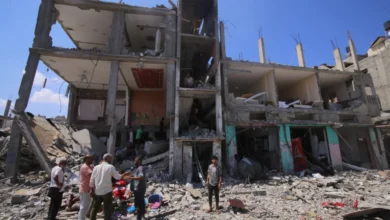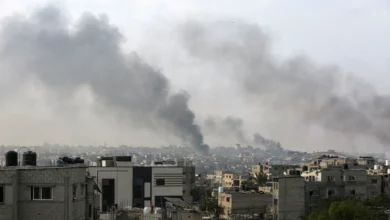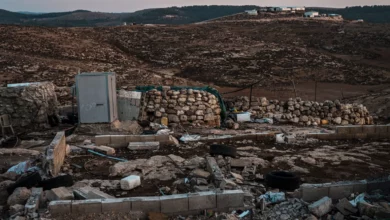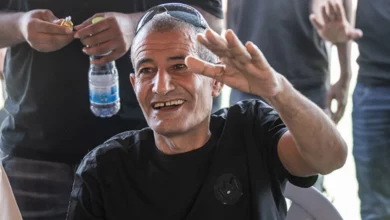Egyptian President Hosni Mubarak has been discussing “lifting the siege off Gaza” with Palestinian leader Mahmoud Abbas at a meeting in Sharm el-Sheikh, government-run Al-Ahram newspaper reports, peppering its front page with more latest news on high school examinations and World Cup results.
Independent newspapers such as Al-Shorouq and Al-Dostour follow up on police violence victim Khaled Saeed with opinion pieces on the killing, and cover Arab League Secretary General Amr Moussa’s unprecedented, albeit controversial, visit to Gaza.
Both state-run and independent newspapers coincide in reporting that the attorney general has decided to order a new autopsy for 28-year-old Saeed, and on covering the recent dispute between lawyers and judges. On Wednesday, parliament speaker Fathi Sorour said the dispute “can only be resolved by law. Law is above all. And the lawyers trust in the judicial system.”
Hamdi Khalifa, head of the bar, called for an emergency meeting of the lawyer’s syndicate, saying the differences must be put aside and the dispute brought under control. “No one knows what will happen to some 450,000 lawyers across Egypt if this crisis continues,” he is quoted in Al-Ahram as saying.
The “crisis” began when clashes erupted between lawyers on the one hand and judges and prosecutors on the other, after two lawyers were sentenced to five years each in prison for assaulting the chief prosecutor of the Nile Delta city of Tanta last week. On Sunday around 10,000 lawyers filed complaints with the attorney general against Ahmed el-Zend, head of the Egyptian Judges Club. Around 800 judges then filed slander complaints against Khalifa and former syndicate board member Montasser el-Zayat, saying they were “inciting riots inside courtrooms.”
Judge Ahmed Mekki, deputy head of Egypt’s appeal court, tells independent daily Al-Shorouq that the core of the “crisis” between the judges and lawyers is due to the latter feeling that they’re “treated unjustly, and humiliated while they’re performing their duties.” Giving examples, Mekki says that lawyers have no designated benches in the courtroom, and sometimes have to stand in the aisles or on the stairs. “Add to that their feeble financial compensation … This is a revolution brought about because of demoralization.”
Meanwhile, the body of Saeed, the man believed to have been beaten to death by two policemen, is to be re-examined by a council of three independent forensic experts to determine the cause of death. Official reports previously said that Saeed died after swallowing a packet of drugs, which got lodged in his throat and killed him. However, leaked pictures of Saeed showed his body bruised and his face violently battered, with his jaw clearly dislocated and lower lip dangling, leading to the conclusion that he was assaulted before death.
The incident caused a public outcry and has spurred protests in Cairo and Alexandria, with people calling for the resignation of Interior Minister Habib el-Adly and human rights watchdogs calling for a thorough investigation of police brutality across Egypt.
In Al-Dostour, Wael Abdel Fattah writes that the problem has transcended the executive powers and is mainly a problem “of an authoritative system that is out of control.” He writes that the “powers-that-be” endorse an “old-school” systematic use of torture, since, having lost credibility, “torture is one excessive means by which they can take control.”
Al-Shorouq reports that Washington is “concerned” about Saeed’s death and that calls between the Egyptian and US foreign secretaries have taken place, with US State Department spokesperson Philip Crowley quoted as saying that Washington has insisted that Egypt punish those accountable for the incident.
In other news, Al-Shorouq reports through “an informed source” who chose to remain anonymous that Egypt is again pushing for reconciliation between Palestinian political rivals Hamas and Fatah, through renewing mediation efforts. The statement came following a hyped-up visit by Arab League General Secretary Amr Moussa to Gaza, during which he called for lifting the economic blockade that Israel has imposed on the strip since 2008.
The timing of Moussa’s visit was controversial, and it has been reported that some Palestinians have been crying out that Moussa’s visit came too late. In his column in Al-Shorouq, Salama Ahmed Salama questions the real purpose behind the “carefully planned” visit and behind Egypt’s seemingly sudden support for Gaza: “Moussa’s visit was pale, a reminder of visits that EU convoys make to refugee camps, and if not for the flotilla, this visit would have never taken place.”
Salama says Egypt doesn’t want the blockade lifted, “but lightened,” and ongoing calls between Egypt and Israel, and also with Washington, are aimed at securing Egypt’s national welfare and security in the case of the blockade being lifted, which is itself strongly tied to a reconciliation between Hamas and Fatah.
“Without this [reconciliation], everything will remain as it used to be [before the flotilla incident],” Salama writes.
Egypt’s newspapers:
Al-Ahram: Daily, state-run, largest distribution in Egypt
Al-Akhbar: Daily, state-run, second to Al-Ahram in institutional size
Al-Gomhorriya: Daily, state-run
Rose el-Youssef: Daily, state-run, close to the National Democratic Party’s Policies Secretariat
Al-Dostour: Daily, privately owned
Al-Shorouq: Daily, privately owned
Al-Wafd: Daily, published by the liberal Wafd Party
Al-Arabi: Weekly, published by the Arab Nasserist party
Youm7: Weekly, privately owned
Sawt el-Umma: Weekly, privately owned




